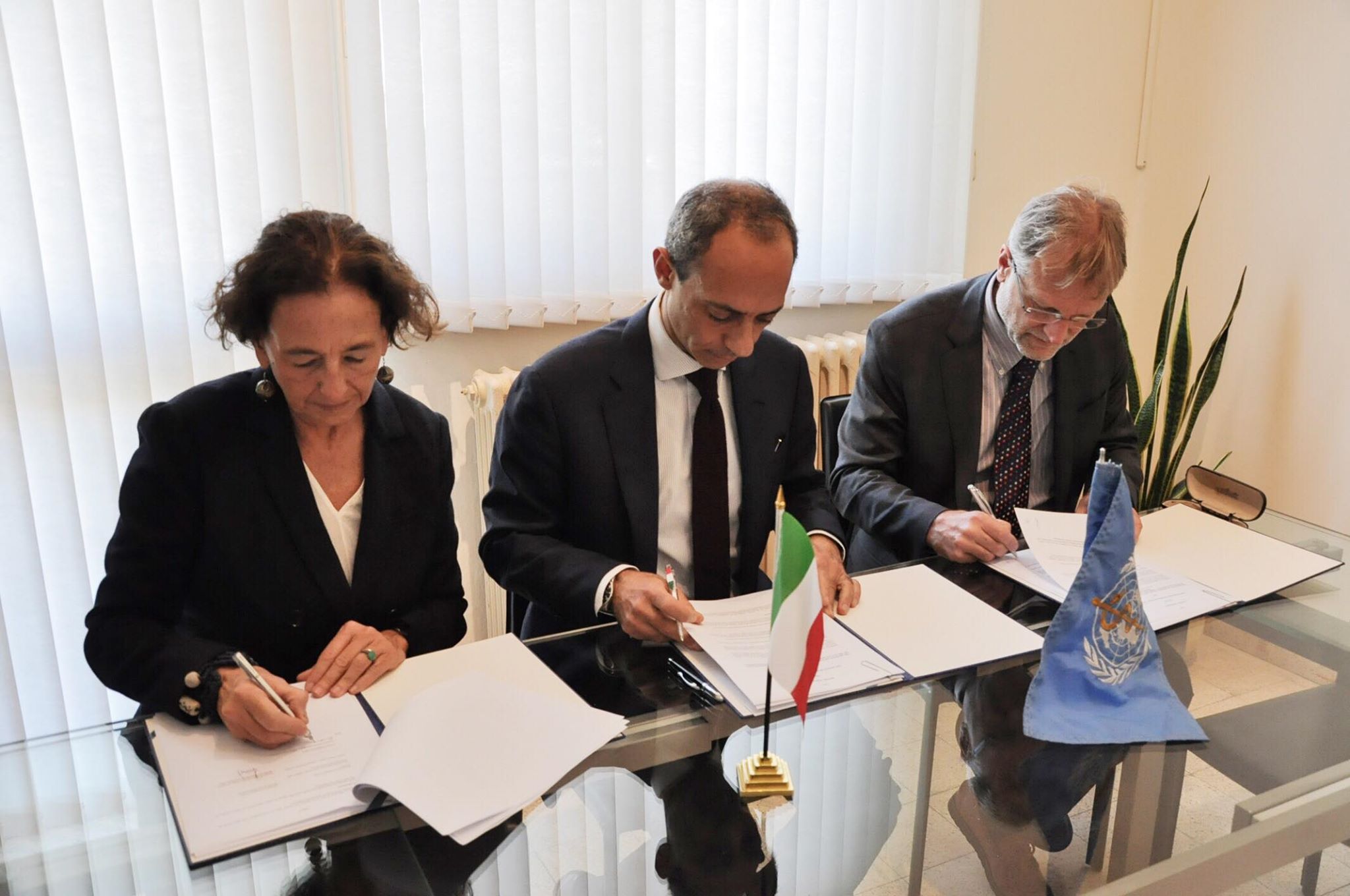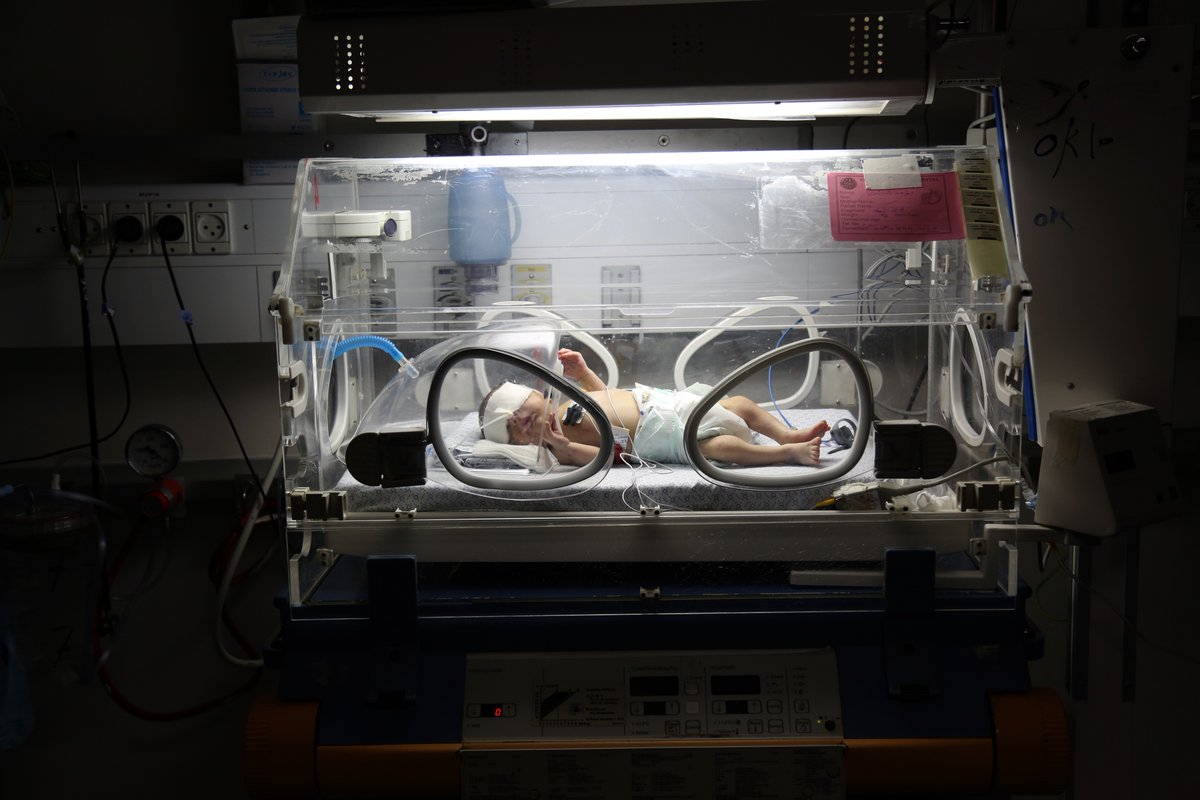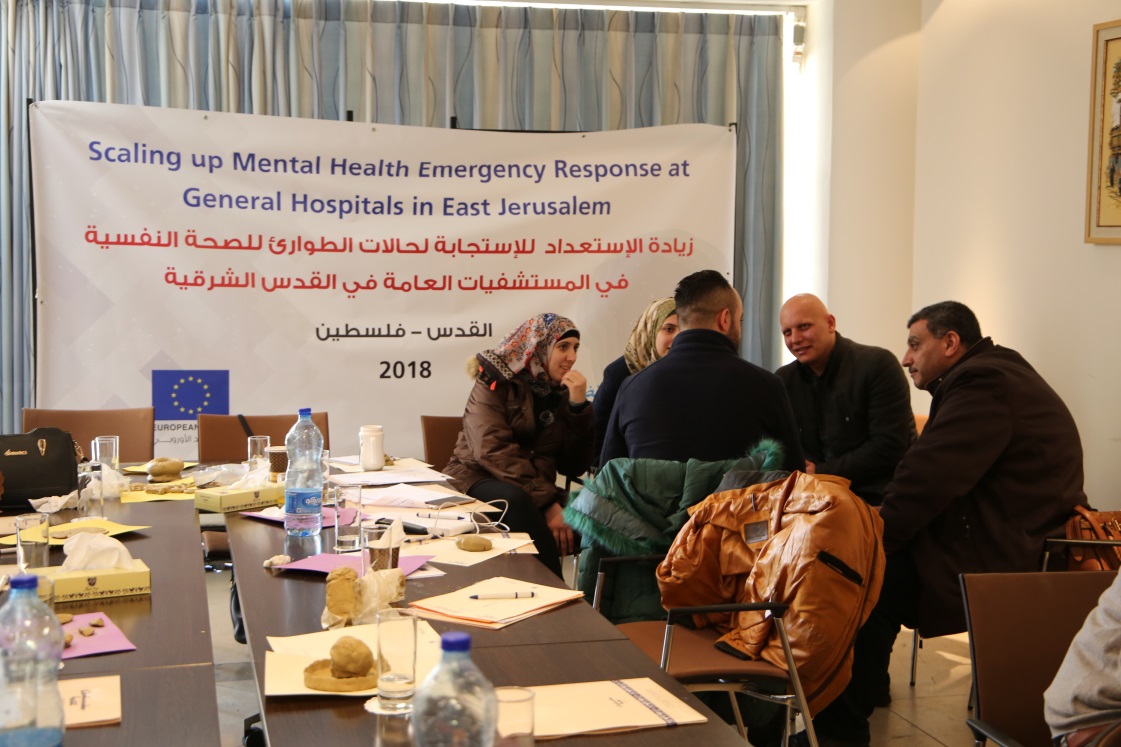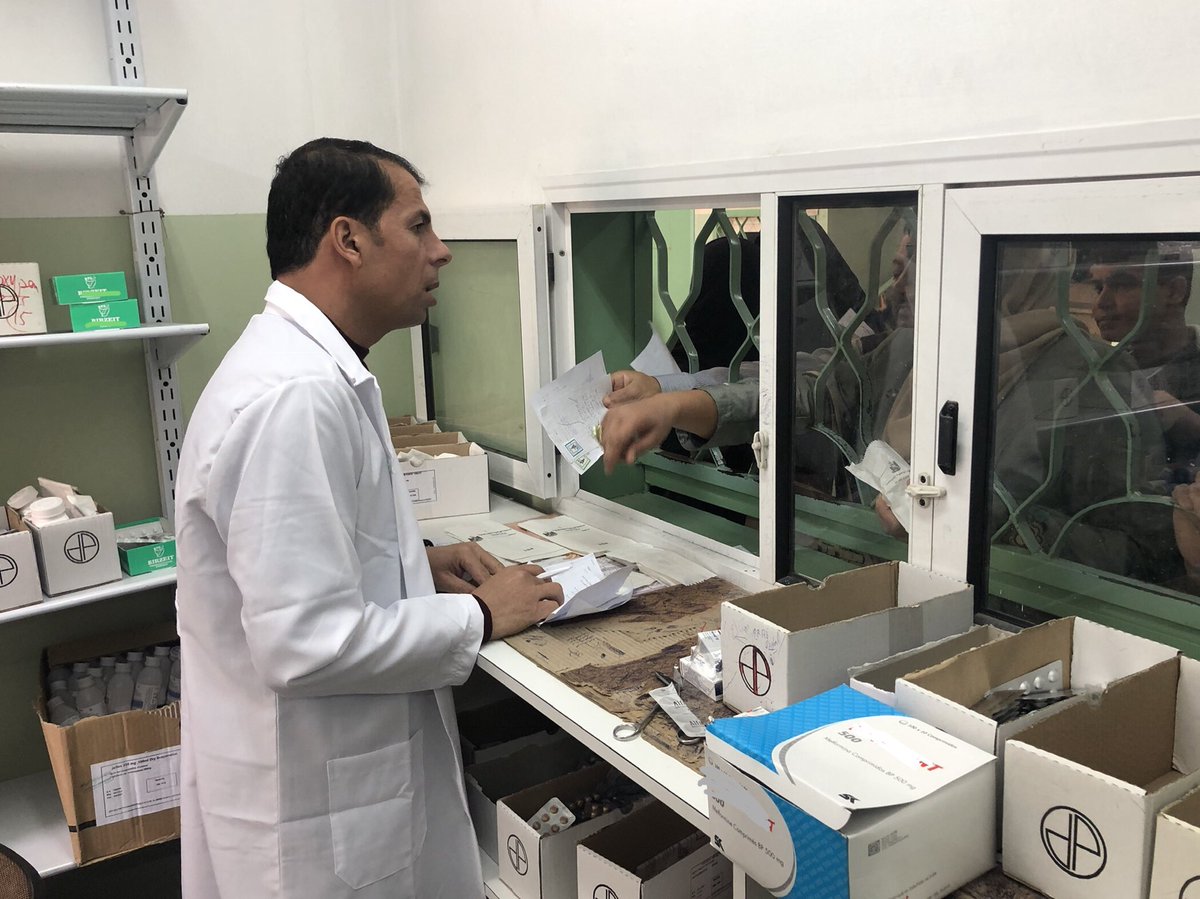Improving the health system in the West Bank and Gaza to achieve health for all
 Credit: Italian Cooperation22 January 2019 – With the generous support of the Italian Cooperation, World Health Organization in the occupied Palestinian territory is launching a 2-year project to improve the health system to achieve universal health coverage. The health system in the West Bank and Gaza is afflicted by the continued occupation, prolonged conflict and deteriorating social-economic conditions. The funding from the Italian Cooperation will help to implement a number of interventions to support the improvement and sustainability of the Palestinian health system.
Credit: Italian Cooperation22 January 2019 – With the generous support of the Italian Cooperation, World Health Organization in the occupied Palestinian territory is launching a 2-year project to improve the health system to achieve universal health coverage. The health system in the West Bank and Gaza is afflicted by the continued occupation, prolonged conflict and deteriorating social-economic conditions. The funding from the Italian Cooperation will help to implement a number of interventions to support the improvement and sustainability of the Palestinian health system.
Within the Improving health systems towards universal health coverage project, WHO, under the Ministry of Health leadership, will foster the continuity of service delivery based on evidence-supported decisions. To strengthen the ability of the health system to deliver quality health services, WHO will also focus on addressing the remaining gaps in mental health care, the rollout and promotion of early essential newborn care and strengthening referral pathways for vulnerable patient groups.
“We are grateful to the Italian Cooperation for their financial support that will help us to enhance the Palestinian health system on the road towards universal health coverage. This project will effectively complement other WHO and the Ministry of Health activities to support health development in the West Bank and Gaza,” said Dr Gerald Rockenschaub, Head of the WHO office for the West Bank and Gaza.
“Supporting and strengthening of the Palestinian health system is one of the priorities of Italian development cooperation in Palestine. A system that can provide universal health coverage is essential for the well-being of its population. Italy is deeply committed to Palestine’s capacity and institution building, with the prospect of establishing a future Palestinian State within the framework of the 2-state solution” said the Consul General of Italy in Jerusalem, Fabio Sokolowicz.
“This initiative with WHO is part of our strategy for the enhancement of the Palestinian health system and the Ministry of Health, that we are currently supporting with a general contribution of 36 million Euro. We are also building 2 hospitals in Dura and Halhoul through a €10 million soft loan and we are participating in the European Programme PEGASE, which aims at supporting the 6 hospitals of East Jerusalem,” stated Cristina Natoli, Head of the Italian Agency for Development Cooperation in Jerusalem.
The Improving health system towards universal health project will contribute to building the resilience and responsiveness of the Palestinian health system that is centred on people’s needs and circumstances. In the occupied Palestinian territory, WHO has consistently supported health system strengthening through leadership and governance, health information systems, health financing, human resources for health, essential medical products and technologies, and service delivery.
Related link
WHO concerned over health impact of evolving fuel crisis in Gaza
 21 January 2019, Gaza - The World Health Organization is concerned over the potential impact the evolving fuel crisis in Gaza might have on the lives and health of patients whose treatment requires uninterrupted power supply if no immediate solution to address the aggravating shortages is found.
21 January 2019, Gaza - The World Health Organization is concerned over the potential impact the evolving fuel crisis in Gaza might have on the lives and health of patients whose treatment requires uninterrupted power supply if no immediate solution to address the aggravating shortages is found.
The functionality of Gaza’s 14 public hospitals is increasingly jeopardized by electricity shortages and the rapidly declining UN coordinated fuel reserves required to run emergency generators during prolonged electricity cuts from the main grid.
Several of the most severely impacted hospitals have already put rationalization measures in place and suspended sterilization, diagnostic imaging, cleaning, laundry and catering services during cut-off hours. Elective surgeries have been further reduced and drastic service reductions, including closures of wards and hospitals, are imminent, doctors and nurses in Gaza are warning.
Hundreds of patients, including newborn and children, whose life depends on the availability of dialysis services, incubators and ventilators in intensive care units, and other electrical life-sustaining devices, and those requiring surgical interventions will be directly affected.
“The acute fuel shortages are rapidly exhausting the last coping capacities of the health system in Gaza, which is struggling with chronic shortages of pharmaceuticals, medical supplies and electricity. Without a quick solution to address the critically low emergency fuel supplies in hospitals, many of the most vulnerable patients will be put at risk. Following our visits to several affected facilities in Gaza to assess the situation firsthand, we call on all parties to de-politicize health and to collectively ensure that lifesaving services are sustained,” said Dr Gerald Rockenschaub, head of WHO office for the West Bank and Gaza.
Current fuel reserves are expected to sustain critical hospital services for only a few more days, depending on the number of hours of electricity cuts.
WHO calls on the local authorities in Gaza and on all parties and stakeholders to meet their responsibilities and to ensure the right to health and sustained access to essential health services for all patients.
For more information, please contact:
Olha Izhyk
WHO Communication Officer
(+972) 547716392
Scaling up mental health emergency response in East Jerusalem
 Medical staff from three hospitals in East Jerusalem received WHO training on mental health emergency response. Credit: WHOIn December 2018, the World Health Organization (WHO) in cooperation with the Palestinian Counseling Center (PCC) provided training to 70 medical staff from three general hospitals in East Jerusalem on mental health emergency response. The training was based on the WHO Psychological first aid guide for field workers that reflects the emerging science and international consensus on how to support people in the immediate aftermath of extremely stressful events.
Medical staff from three hospitals in East Jerusalem received WHO training on mental health emergency response. Credit: WHOIn December 2018, the World Health Organization (WHO) in cooperation with the Palestinian Counseling Center (PCC) provided training to 70 medical staff from three general hospitals in East Jerusalem on mental health emergency response. The training was based on the WHO Psychological first aid guide for field workers that reflects the emerging science and international consensus on how to support people in the immediate aftermath of extremely stressful events.
During the training, nurses, general practitioners, social workers and lab technicians from Augusta Victoria Hospital, Saint Joseph Hospital and Al Maqased Hospital discussed ways to deliver psychological first aid, sustain patients and their caregivers’ well-being and support them in coping with mental health issues during emergencies.
Shoushan Franj, who is leading the psychosocial staff team at Augusta Victoria Hospital, says: “The training helped us to understand better how to prioritize the response in emergencies and the role of each department in mental health preparedness. It was also a great opportunity to highlight the importance of social workers at hospitals and the need to integrate mental health support in the treatment processes. Our next step is to draft and finalize an emergency intervention plan on mental health.”
During and after emergencies, people are more likely to suffer from a range of mental health problems. Some may develop new mental disorders after an emergency, while others experience psychological distress. Those with pre-existing mental disorders often need more help than before. Through a series of training workshops, WHO provides capacity building to the health staff across the occupied Palestinian territory to scale up their ability to respond to the mental health problems during emergencies.
The workshops are part of the WHO project funded by the European Union - Building Palestinian resilience: Improving psychosocial and mental health responses to emergency situations. The project addresses critical gaps in the development of mental health services in the occupied Palestinian territory, particularly concerning mental health emergency response.
Related story: Promoting mental health and well-being among students in the West Bank
1.2 million people in the occupied Palestinian territory are in need of humanitarian health assistance
 The Central Drug Store of the Ministry of Health in Gaza is experiencing the worst shortage in essential drugs since 2014. Credit: WHOWHO and health partners require US$32 million to address acute health needs of the most vulnerable communities in the occupied Palestinian territory. 1.2 million Palestinians are in need of humanitarian assistance. Without funding for interventions, their health will deteriorate.
The Central Drug Store of the Ministry of Health in Gaza is experiencing the worst shortage in essential drugs since 2014. Credit: WHOWHO and health partners require US$32 million to address acute health needs of the most vulnerable communities in the occupied Palestinian territory. 1.2 million Palestinians are in need of humanitarian assistance. Without funding for interventions, their health will deteriorate.
The Gaza health system is overburdened with an enormous rise in casualties from the Great March of Return demonstrations near the fence with Israel. Since 30th March 2018, over 25,000 Palestinians were injured and over 250 killed. The Central Drug Store of the Ministry of Health in Gaza is experiencing the worst shortage in essential drugs since 2014. Around 52,000 people - half of whom are children - are in need of mental health and psychosocial support as a result of the ongoing tensions in Gaza.
In the West Bank, physical obstacles, the discriminatory zoning regime, long distances to hospitals and a lack of public transportation are all factors that hamper access to healthcare services for Palestinians. Access to specialized care not available in Gaza and the West Bank is compromised by the requirement to obtain Israeli-issued permits to exit.
“WHO and humanitarian health partners are struggling to address essential health needs of people in the occupied Palestinian territory. We are concerned that without support from the international donor community thousands of Palestinians won’t be able to access life-saving services”, said Dr Gerald Rockenschaub, Head of the WHO office for the West Bank and Gaza.
The health plan for 2019 prioritizes assistance for people in need of life-saving interventions whilst building the resilience of the health system to better cope with acute emergency events. This enables WHO and health partners to provide a targeted and focused response.
The 2019 Humanitarian Response Plan for the occupied Palestinian territory was launched on 17th December 2018. In total, it appeals for US$350 million to provide basic food, protection, health care, shelter, water and sanitation to address the priority needs of the most vulnerable Palestinian communities.
More information: Humanitarian Response Plan 2019








